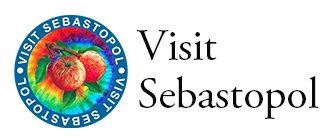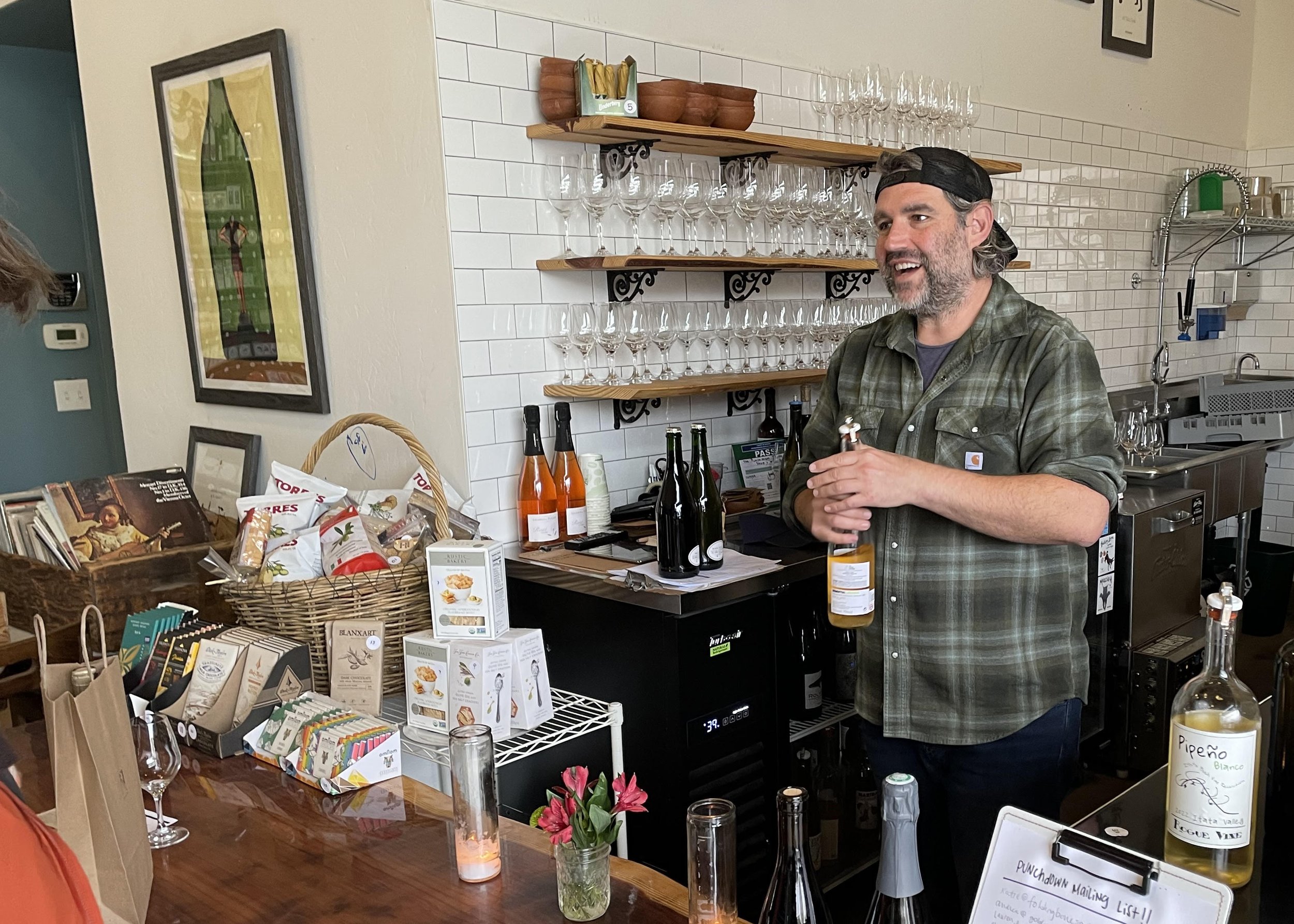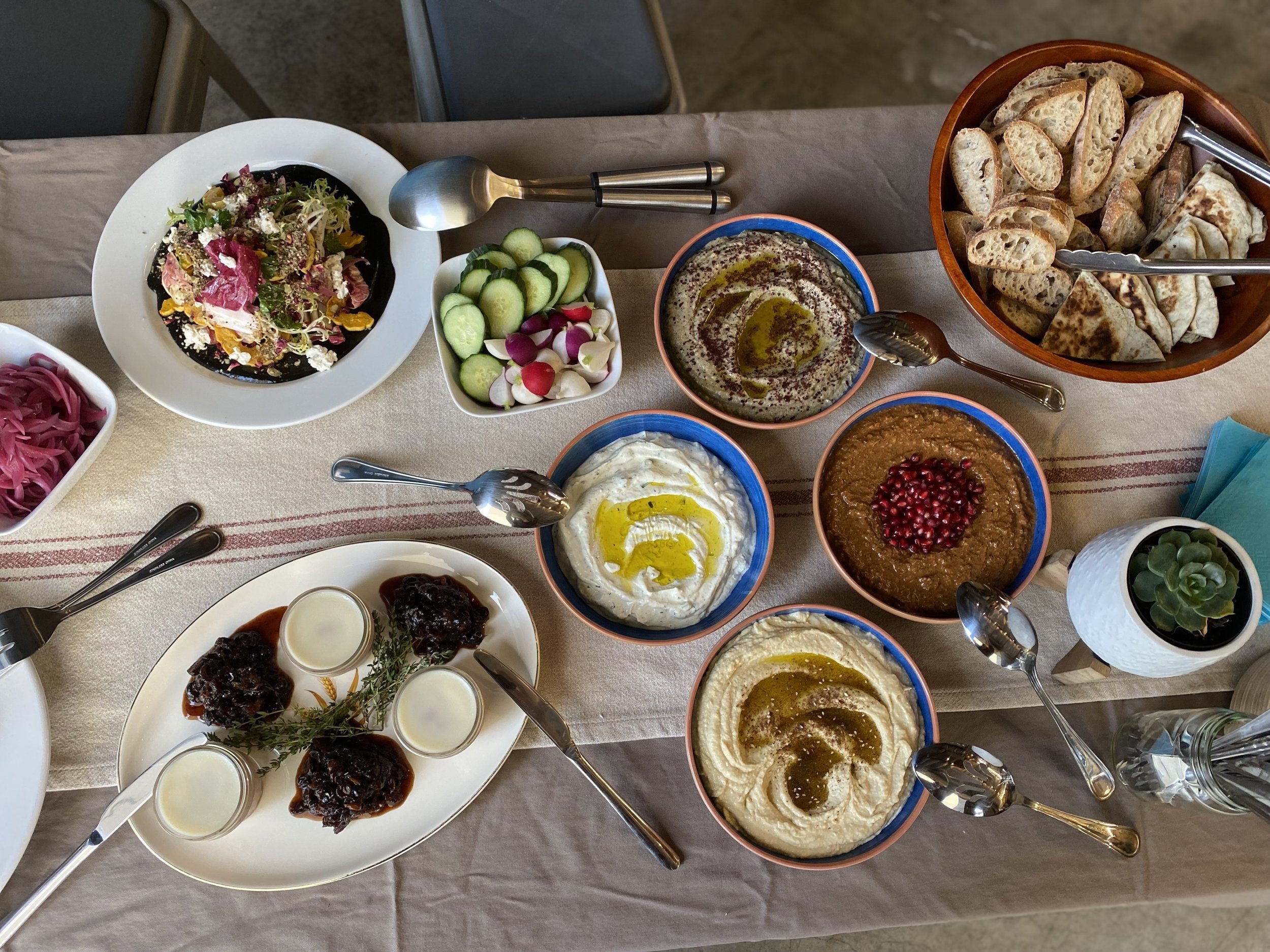Wine, naturally!
DC Looney is co-owner (with his wife Lisa Costa) of The Punchdown, a natural wine tasting room and wine store in the Barlow. (Photo by Laura Hagar Rush)
In the last few years, Sebastopol has become a mecca for natural wines. There are two restaraunts/wine bars—Piala and The Redwood—that feature natural wines exclusively, and in 2023, the most famous natural wine bar in the Bay Area, The Punchdown, opened a new location—a tasting room and wine store—in the Barlow, the center of Sebastopol’s food and wine maker culture.
Here’s a quick tour of natural wine in Sebastopol.
The Punchdown
The Punchdown opened in Sebastopol in May of this year. It’s their second location. The original, which is located in downtown Oakland, has been open since 2010; it’s a mecca for natural wine fans and was nominated for a James Beard award for their wine selection in 2022.
The owners, DC Looney and Lisa Costa, moved to Sebastopol with their new baby in 2020.
In a way, it was a return to their roots. They met while working the harvest north of Sebastopol at Williams Selyem in 2007. Both have deep wine backgrounds.
“Lisa's actually a certified sommelier,” Looney said. “I have a master's degree in wine marketing that's through an international program, OIV, which is based in Paris. I traveled to 32 countries in two years, learning all about wine.”
The wine selection at the Sebastopol location fills two long walls of their spacious tasting room. They carry wines from around the world—France, Italy, Spain, the Republic of Georgia, Australia, Chile and many more—and have a great selection of locally produced natural wines as well.
What is natural wine?
The phrase “natural wine” refers, in general, to wines made without chemical intervention at all stages of winemaking from vineyard to bottle, but The Punchdown takes that a step further.
“Our favorite wines are what we call “zero-zero” or "super natty" or "vivant" (living). This means that there is nothing added or taken away during the entire winemaking process,” Looney said.
There’s a terrific description of their guiding principles on their website, which includes the following:
The vineyards should practice a "more than organic" approach. This means that they should be farmed using natural farming principles (organic, biodynamic, ancestral, "do nothing") without the use of chemicals (especially the use of Round-Up which has been shown to be residual in the finished wines in 100% of the vineyards tested that use it). The soils should be teeming with good microbial life, creating a healthy and balanced ecosystem (which is better for our health and the environment too).
Transparency in the winemaking: minimal intervention throughout the entire wine-making process. No additions of the naturally occurring components (yeast, water, acid, tannin, sugar, enzymes, nutrients, etc.) and especially no chemical additions used to change the flavor, aroma, structure, color, texture of a wine. If grandma doesn't know what it is, then there is no need to add it to our wine. Good healthy fruit can equal good healthy wine; no need to mess around with it too much.
“The point is if you have good healthy organic fruit, you can make a good healthy organic wine. It's been done for hundreds of years,” Looney said.
“We just wanted to sell what we liked,” he said, noting that he and Costa simply don’t drink non-natural wines anymore.
Natural wines have a broader palette of flavors than industrially-produced wines and even some smaller production wines, which have been shaped by interventions to make them fit expected flavor profiles.
Some of the flavors in natural wines are seen as “faults” in modern wine making, but Looney said, “At the end of the day, I'm more accepting of a fault than I am a correction.”
“You might have to adjust your palate and your frame of flavors that you're looking for, but once you make that adjustment then it's hard to go back to other wines,” he said.
He compares it to cheese.
“Somebody's cheese isn’t defective because it smells like feet, right? It’s just a stinky cheese. You know, these are stinky wines,” he said, half-joking. “They have more flavor, and they're not corrected. We drink the purest zero-zeros. We like it to be alive, where it's a natural product that's raw fermented, and our palates are flexible enough, where if it does taste a little different, we like that.”
Looking over the wine selection at Punchdown, you’ll notice a few unusual things that you won’t find even in a well-stocked grocery store wine section: orange wine (which can look like a rosé, but is made from white instead of red grapes); Pét-nats (short for petillant naturel—a precursor to champagne); and unusual blends made from wine varieties rarely seen in the United States. They also have a large selection of naturally made Champagnes and other sparklers.
We asked Looney to recommend some wines for readers who may be unfamiliar with natural wines and want a little guidance. (One thing you’ll notice as you scan the shelves here is the near absence of well-known winery names – the thing most people go by when choosing a wine.) You could also, of course, just go to The Punchdown for a tasting (so fun!) and choose based on that as well.
Three wines for people new to natural wines
Domaine Saint Germain's Crac Boum'bu Blanc, Onda Brava Moscatel de Alexandria, and Garrut (a Mourvedre)
Domaine Saint Germain's Crac Boum'bu Blanc. Coming from the Savoie region of France, the white wine is a field blend of Jacquère, Chardonnay, and Malvoisie. It’s harvested early which results in lower alcohol. “Really fresh,” Looney said. “It tastes like snowmelt.”
Onda Brava Moscatel de Alexandria. Some of the first wine varieties in the Americas, which were brought over from Spain, still thrive in Chile. Moscatel of Alexandria is one of these. Sixty- to 100-year-old vines yield grapes that are hand-destemmed and foot-trodden. This wine is a partnership between a winemaker from the Sierra Foothills and his counterpart in Chile.
Garrut is the Spanish name for the red grape known as Mourvedre or Mataro. Looney calls this wine by Spanish winemaker Jordi Llorens “light, fresh and fun. This is a really easy drinking light red that we would call ‘glou glou,’” which is the French slang for the sound of the bottle tipped upside down. From the Catalonia region of Spain.
And don’t forget about the tinned fish!
Tinned fish at The Punchdown in Sebastopol.
Popular at natural wine bars everywhere, tinned fish is having its moment. The Punchdown has an entire wall of tinned fish, perfect for stocking stuffers.
The Punchdown is located at 6770 McKinley St, Ste 130, in the Barlow, Sebastopol, next door to Indigenous Clothing. (707) 827-3483. Find them online at punchdownwine.com.
Sebastopol’s two restaurants specializing in natural wine
In addition to The Punchdown, which serves light snacks, there are two natural-wine-oriented restaurants in Sebastopol:
Georgian cuisine with natural wine at Piala
Piala is a wine bar and restaurant, which specializes in Georgian cuisine. It is located at 7233 Healdsburg Ave., Sebastopol. (707) 861-9186. pialanaturalwine.com. (Note: they’ll be closed for the holidays from Dec. 24 to Jan. 2.)
The menu at The Redwood is designed around natural wines.
The Redwood is a natural wine bar and cafe, offering small plates and dinners of well-curated, locally sourced specialties. The restaurant, which also has a bottle shop, opened in February and was founded by Khom Loi alumni Geneva Melby and Ryan Miller. It is located at 234 S Main St, Sebastopol. (707) 861-9730. theredwoodwine.com





